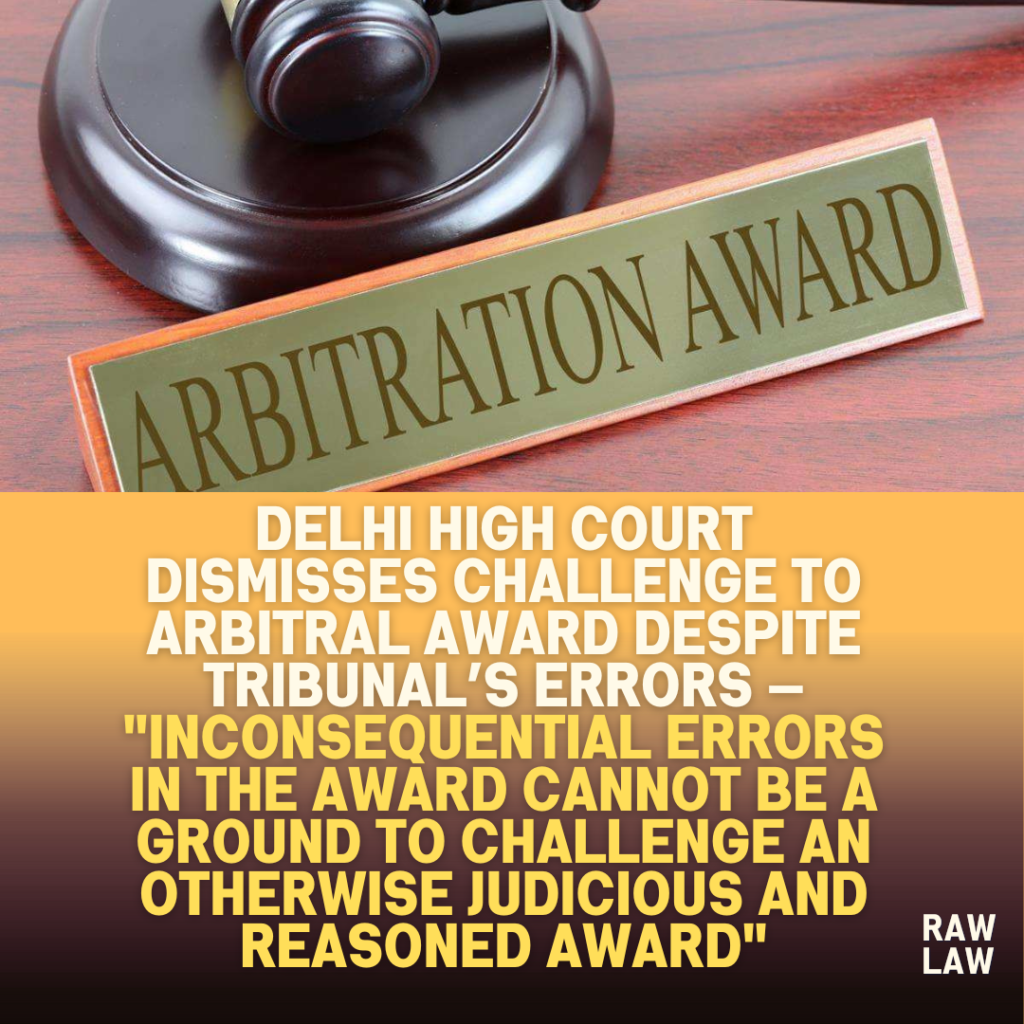Court’s Decision
The Delhi High Court dismissed a petition under Section 34 of the Arbitration and Conciliation Act, 1996 challenging an arbitral award dated 05.09.2016. The award had rejected the petitioner’s claims for balance consideration of Rs. 14,32,918/- and upheld the respondent’s counterclaims, primarily on the ground of design deviation in a machine supplied under a tender. The Court held that although the arbitral award suffered from omissions and inconsequential factual errors, it was based on a reasoned conclusion: “One item of deviation admitted by the Petitioner was found to be sufficient for the Tribunal to uphold the rejection of the machine.”
Facts
The respondent had issued a tender for procurement of a “Double Column Guillotine Shearing Machine with Hydraulic Main Drive,” which the petitioner agreed to supply. The purchase order was accepted on 07.06.2005, and as per contract terms, the petitioner had to deliver the machine within 10 months (by 21.04.2006). However, the machine was supplied on 28.07.2008 — a delay of over two years.
Following extensive trials by the consignee (RCF), the machine was ultimately rejected on 25.04.2011 due to alleged design and quality deviations. The petitioner raised a claim for outstanding consideration with interest, while the respondent counterclaimed for refund of the paid amount (Rs. 1.14 crores) and additional compensation of Rs. 4.38 crores for having to procure a replacement.
Issues
- Whether the rejection of the machine was beyond the contractual 45-day period under Clause 2102.
- Whether the design modifications demanded by the respondent were within the scope of the Agreement (AT).
- Whether the machine conformed to technical specifications, particularly regarding the guiding system.
- Whether the Tribunal ignored key evidence and rewrote the terms of the contract.
- Whether the award was liable to be set aside for overlooking vital correspondence and inspection reports.
Petitioner’s Arguments
The petitioner contended that the rejection was contractually invalid as Clause 2102 required the machine to be rejected, if at all, within 45 days from delivery, i.e., from 28.07.2008. They alleged that the Tribunal erroneously extended this period by reading “delivery” as “successful commissioning,” which was not contractually permissible. They further argued that:
- The Tribunal ignored multiple letters wherein the petitioner opposed the modifications demanded by RCF, which were allegedly outside the contract.
- Key deviations in design, such as replacement of the Roller Guiding System with a Flat Guiding System, were approved through silence or waiver and should not have led to rejection.
- The Tribunal failed to discuss critical inspection reports and letters acknowledging usage and trials over several months.
- The issue of space constraints for installation was wrongly framed and never adjudicated.
- Incorrect findings such as submission dates of GA drawings and nature of trial usage were recorded.
Respondent’s Arguments
The respondent maintained that the petitioner delivered the machine over two years late and that it failed to meet contractual specifications. It claimed that the machine was rejected due to deviations such as:
- Use of Flat Guiding System instead of the specified Roller Guiding System.
- Single-piece blades instead of the required two-piece configuration.
The respondent also asserted that trials and requests for rectifications did not constitute acceptance, and that the commissioning was never successfully completed. It justified the rejection based on the failure to conform to paragraph 3.2.3.6 of the contract, supported by an inspection report dated 30.06.2010.
Analysis of the Law
The Court reiterated that under Section 34 of the A&C Act, interference with an arbitral award is permissible only when the award is perverse or in patent disregard of the contract or evidence. Interpretation of contractual terms is within the Tribunal’s domain. The Court distinguished between mere interpretative errors and errors warranting judicial interference.
It observed that:
- The Tribunal was justified in interpreting “delivery” under Clause 2102 to include “successful commissioning,” since the machine was subject to trial runs and final acceptance.
- The Tribunal’s approach to assessing scope of design deviations was not entirely meticulous but was grounded in contractual obligations.
- The Tribunal correctly found that a single admitted deviation (i.e., the flat guiding system) was sufficient for rejection, even if other deviations were not elaborated upon.
Precedent Analysis
While no prior judgments were explicitly relied upon in the award or the High Court’s ruling, the Court followed the settled law that arbitral awards should not be interfered with on minor factual or interpretive disagreements, citing the principles underpinning Section 34 challenges such as “public policy,” “perversity,” and “non-judicious conduct.”
Court’s Reasoning
The Court held that although the Tribunal had:
- Incorrectly noted some dates and missed discussion on certain deviations;
- Overlooked correspondence objecting to deviations; and
- Rendered findings on certain issues like space constraint and drawing submission that were not critical;
—these issues were inconsequential because the rejection of the machine was upheld solely due to one major admitted deviation, i.e., the change from Roller to Flat Guiding System. The Tribunal’s reliance on the petitioner’s admission was sufficient to justify the rejection and dismissal of claims.
The Court emphasized that it is not open to “re-evaluate the sufficiency of each deviation item” once a critical design breach is admitted.
Conclusion
The Court upheld the arbitral award and dismissed the Section 34 petition. It held that:
“Inconsequential errors in the award cannot be a ground to challenge an otherwise judicious and reasoned award.”
The Tribunal’s reliance on the admitted design deviation alone was sufficient to justify its conclusions.
Implications
The judgment reinforces the principle that arbitral awards will not be set aside merely because they are poorly drafted or factually imperfect, as long as the core conclusion is supported by the contract and evidence. Admissions by a party during performance may validate contract termination or rejection, even in the face of otherwise disputed facts.
Also Read: Delhi High Court Upholds Conviction for Aggravated Rape of 5-Year-Old Under POCSO Act



